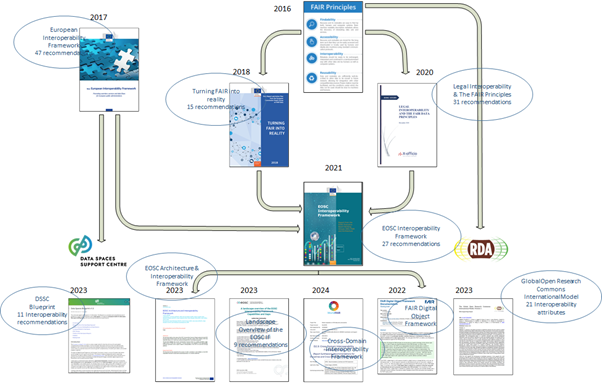D6.4: Cross-domain recommendations and feedback for the EOSC Interoperability Framework
The aims and structure of the deliverable
Since the publication of the "Turning FAIR into Reality" report, numerous interoperability frameworks have been developed, each varying in their connection to the European Open Science Cloud Interoperability Framework (EOSC IF), and offering recommendations to improve data accessibility and sharing. In such a diverse and complex ecosystem, researchers, data producers, and service providers may struggle to identify the most suitable framework for their interoperability needs. Hence providing an overview and conducting an analysis on the subject is a timely matter.
This report analyses various interoperability frameworks related to the European Open Science Cloud (EOSC) and beyond. It aims to assess their implementation, challenges, and alignment with global standards to improve data sharing and accessibility across scientific disciplines. It also examines the coordination efforts among EOSC projects, EOSC task forces, and international organisations such as the Research Data Alliance (RDA). The report builds on the outcomes of a series of collaborations and workshops to provide insights into the challenges and advancements in interoperability.
To enhance EOSC interoperability, the report recommends establishing a central repository for interoperability guidelines and profiles, as well as developing a crosswalk registry to improve metadata harmonisation. It also advocates for creation of interoperability compliance metrics and a certification framework, as well as alignment with the Global Open Research Commons (GORC) International Model as a strategic benchmark.
The report further suggests that successful implementation of these recommendations will require a sustained engagement with EOSC technical and semantic interoperability initiatives such as the current and future EOSC Association Task Forces and continued collaboration with European partnerships such as the Data Spaces Support Centre (DSSC) to further refine interoperability solutions.
The complex ecosystem of interoperability frameworks
In the recent decade, a significant number of interoperability frameworks have been established with various degrees of relationship to the EOSC IF, providing recommendations to enhance data accessibility and data sharing.
Researchers, data producers, or service providers could legitimately feel confused when trying to identify the appropriate framework for their interoperability requirements in such a rich, complex ecosystem. The subsections of this deliverable provide a short history, summary of the context, main recommendations, as well as strengths and limitations of a selection of the existing interoperability frameworks.

Figure 1. The ecosystem of interoperability frameworks over time.
Cross-domain recommendations for the EOSC Interoperability Framework
The cross-domain recommendations aim to enhance the effectiveness and adoption of the EOSC Interoperability Framework by addressing key challenges and opportunities identified in the frameworks analysis as well as the takeaways from the different collaborations and workshops. These recommendations focus on improving the ease of the implementation of legal, organisational, semantic, and technical interoperability within the EOSC ecosystem. They are for concrete actions, or initiatives, and ready to be picked up by other projects or in funding programmes.
| # | For Whom? | Recomendations |
| #1 | Service provider and researchers | Interoperability profiles and guidelines tailored for these different stakeholders should be gathered in a central repository |
| #2 | Service provider and researchers | Mappings and crosswalks registry to support reuse and adoption across domains. |
| #3 | Policy makers, funders | Clear governance of EOSC adopted interoperability frameworks, models and solutions |
| #4 | Policy makers, funders, service providers | Clear guidance to adopters about available interoperability frameworks, models and solutions and their implementation |
| #5 | Policy makers, funders, service providers | Adopt existing community-based interoperability frameworks, models and solutions that support a holistic approach to interoperability |
Table 1. Cross-domain recommendations for the EOSC IF
Conclusions and next steps
The landscape of interoperability continues to evolve, with multiple frameworks contributing to legal, organisational, semantic, and technical interoperability. However, challenges remain in terms of framework adoption, practical implementation, and long-term sustainability.
These should be addressed by sustaining further engagement with technical and semantic interoperability initiatives such as the EOSC Association Task Forces, other EOSC-related projects like EOSC Beyond (for the repository of interoperability guidelines) and FAIRCORE4EOSC (for the Metadata Schema and Crosswalk Registry (MSCR) or global organisations and initiatives including the RDA FAIR Mappings Working Group, and continued collaboration with European partnerships such as the Data Spaces Support Centre (DSSC) to refine interoperability solutions.